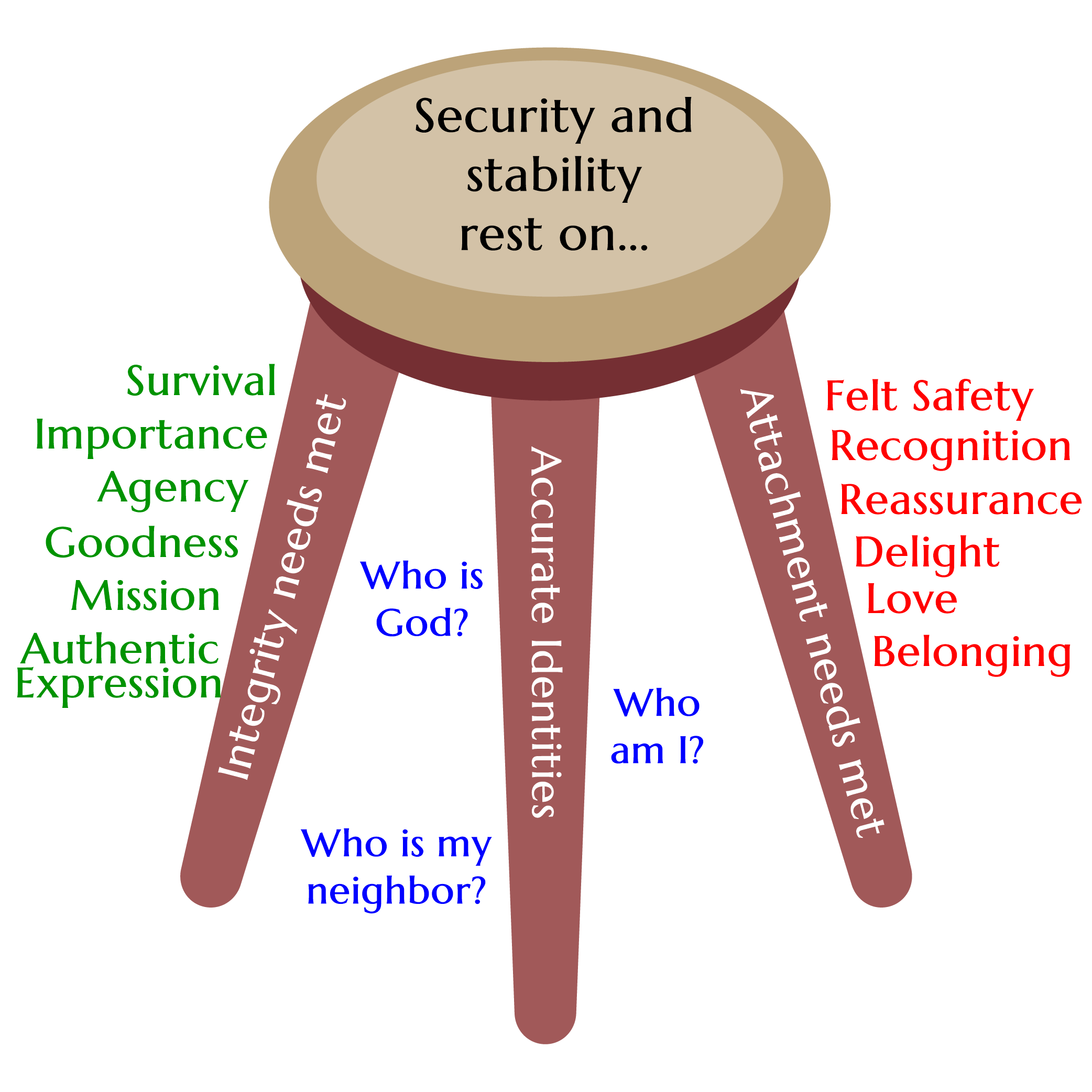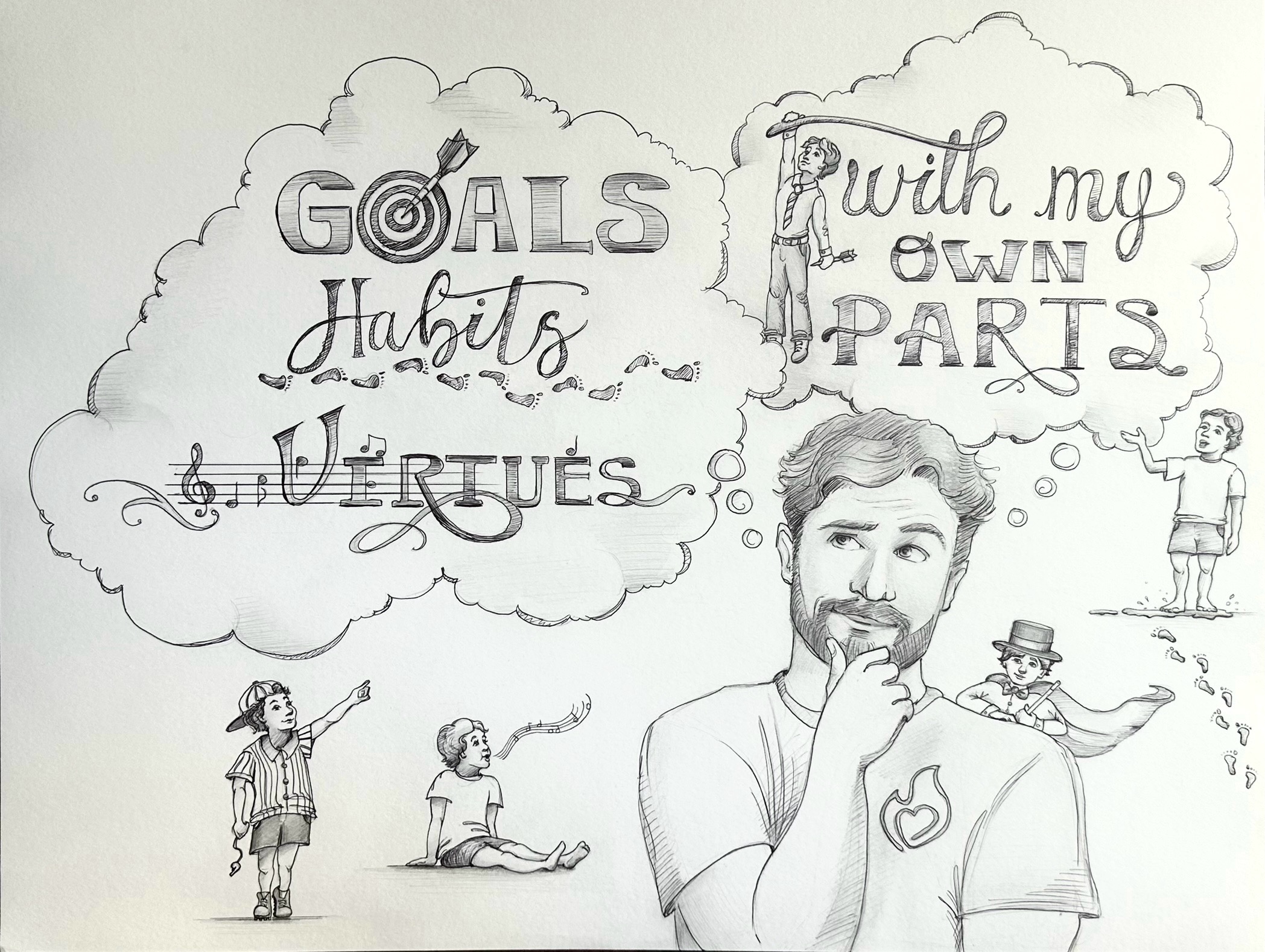Dear Souls & Hearts member,
In our last reflection, titled Doing via goals, habits, and virtues, we broached the topic of doing in the service of being, and noted how your personal vision statement is all about your being (see also here), while your personal mission statement is all about the doing in the service of your being.
But we did not address parts in that reflection.
So now we bring in the dimension of parts and systems thinking, especially informed by Internal Family Systems, to our discussion of goals, habits, and virtues.
Goals
As a brief reminder, according to Dictionary.com, a goal is “the result or achievement toward which effort is directed; an aim or an end.”
Our manager parts are highly focused on goals. Your manager parts work proactively, strategically, with forethought and planning to keep in control of situations and relationships to minimize the likelihood of you being hurt.
Your manager parts work hard to keep you feeling safe and protected. For most people, manager parts are the ones that handle the day-to-day demands of life. They keep things going for you, but they are not really equipped to lead your system or to drive your bus. But they feel they must. They do not feel like they have a choice. So, they engage in controlling, striving, planning, caretaking, and judging.
Managers’ Agendas ≈ Goals
And managers have agendas. I define an agenda as “an inordinate attachment to a particular outcome, using particular means, usually on a particular timeline.”
The wavy equals sign (≈) means “approximately equal to.” If your managers are not in right relationship with your innermost self, each manager will have at least one agenda (≈ one goal) that he or she bids you to pursue. The less integrated the manager part is, the more single-minded he or she is in the pursuit of that agenda or goal.
And most people have two or three prominent managers, each with an agenda. These agendas may complement each other in the case of “management teams” leading a person’s system. For example, if the managers of my management team are not in right relationship with my innermost self, they have these agendas:
- My Good Boy manager, when blended with my innermost self, has an agenda to push to complete all the elements of my daily spiritual plan of life, regardless of how relational I am in prayer or the impact on other people around me, and does not consider whether I am called to some act of charity toward my neighbor.
- My Evaluator manager becomes my inner critic when he blends with my innermost self, and focuses on criticizing my Collaborator part, yearning to goad him on to meet unrealistic expectations of how much I should achieve, regardless of my capacities or situational factors. My Evaluator also can push an agenda for impracticable levels of perfection in my work in an effort to become “good enough.”
- My Collaborator part, when blended, becomes my workhorse, driving and striving with his agenda to “get everything done” on the impossibly long list created by my Evaluator part by just “working harder and faster” with the hope that if I could complete the list, then I could rest.
(I discuss my parts in episode 71 of the Interior Integration for Catholics podcast titled “A New and Better Way of Understanding Myself and Others” and in the February 24, 2025 reflection titled Catholic Personal Vision Statements, Revisited, where I share their dialog in sorting out how to articulate my personal vision statement.)
Managers’ agendas are compromised by the limited vision they have, and by the pressure they feel to try somehow to fill unmet attachment needs, integrity needs, and resolve identity questions, usually carried as burdens by the exiled parts they protect or protect against. Managers are trying to shore up the shaky legs of the “Stool of Security and Stability” within their system (see below).

Because managers have such limited vision, and usually young perspectives, focusing in on narrow agendas, they often end up in polarizations with other parts who are seeking either different goods (often to have needs met), or the same goods, but using different means. The result becomes conflict and polarizations in the system, leading to a lack of coordination and upheaval, like in this brief video of a rowing shell disaster.
Habits and parts
As a brief review, James Clear, in his fascinating book Atomic Habits, defines a habit as “a routine or practice performed regularly; an automatic response to a specific situation.”
John Hardon’s Catholic Dictionary defines a habit as:
“A quality that is difficult to change and that disposes a person either well or badly, either in oneself or in relations with others…. Habits of acting are acquired by constant repetition, and lost by disuse or contrary acts. Good moral habits are virtues; evil ones are vices.”
For most people, habits (for good or for bad) are the common, repeated responses to similar situation that follow the impulses of the parts that are in the driver’s seat of their systems. For many people, habits form as a way of coping with difficulties, in pursuit of agendas of managers, as efforts to solve problems or to meet needs. Thus, a single part, breaking in and taking over the driver’s seat by blending can upend a habit, at least temporarily.
Habits are most stable and most virtuous when they flow from an integrated system, in which all parts are included and valued, under the leadership and guidance of the innermost self. A person whose parts are fragmented and disconnected, all seeking their own agendas, will have difficulty forming solid habits.
One exception to that general rule is in rigid systems in which one or two or three manager parts are able to repress or suppress all other parts for considerable periods of time, and their agenda is imposed on the system; even this tends to be unstable, as the banished parts revolt inside, disrupting the habits that the controlling managers would like to maintain.
Habits flowing from parts’ self-images
As I noted in the last reflection, James Clear states that “…your habits are how you embody your identity. When you make your bed each day, you embody the identity of an organized person. When you write each day, you embody the identity of a creative person. When you train each day, you embody the identity of an athletic person.” [p. 39].
I argue that our habits embody our self-image, not our identity. Your identity, as I make clear in the March 24, 2025 reflection titled Self Images and Identity is given to us by God. Your self-image, on the other hand, is “who you feel yourself to be in a particular moment. Self-images are much more emotionally driven, much more intuitive, subjective, and they vary much more from moment to moment than your self-concept.” And these self-images influence your behaviors.
And each part has a self-image. Parts who are blended and in your driver’s seat will attempt to create habits that are in accord with their self-images and their God-images (see Episode 24 of the Interior Integration for Catholics podcast titled God Images and Self-Images and the eflection from March 24, 2024 Self Images and Identity for more).
Virtues and parts
As a brief review, Fr. John Hardon defines a virtue as “A good habit that enables a person to act according to right reason enlightened by faith. Also called an operative good habit, it makes its possessor a good person and his or her actions also good.”
So virtues are good habits.
In the first century, Marcus Tullius Cicero, stated that “Virtue is its own reward.”
Yes, but there’s a caveat.
Virtue is experienced as its own reward when a person’s system is fairly integrated, when parts are in right relationship with the innermost self. When parts are alienated, ignored, banished from awareness and desperately trying to get basic attachment needs and integrity needs met, an appeal to virtue being its own reward sounds unattuned and out of touch.
For example, if an exiled part bears a burden of feeling invisible, unseen, unknown, unheard, and misunderstood, and is urgently seeking to be recognized, generating impulses to act out in problematic ways to get someone’s attention, any attention from anyone, a moral treatise on virtue being its own reward is unlikely to meet need and lessen the impulses and desires.
As another example, if a firefighter part uses alcohol excessively in an attempt to distract from the pain an exile feels at never having been loved, sitting down with Cicero or Socrates or Aristotle or anyone who is extolling moderation and the virtue of temperance will be unlikely to effect change. Firefighter parts have extremely short time horizons; they focus on the immediacy, the threats, and desperation of the present moment, and can undermine habits and virtues in a flash in the pursuit of an immediate goal or agenda of relief from distress.
In my experience in working with hundreds of people and their parts, parts are much more open to seeking virtue when they have their basic attachment needs and integrity needs met, and have a sense of identity – then they are much more likely to get on board with St. Paul in 1 Corinthians 10:31, to “do everything for the glory of God.” Just like a well-fed waiter is better able to serve good food to restaurant customers than a starving one.
This next idea is highly speculative, and I could be wrong on it, but it seems to me that parts who are not well-integrated can have difficulty accessing the virtues that a person actually possesses. For example, who among us has not experience moments of fear and high anxiety in the face of real or perceived danger, and questioned where God was or whether He would help us? Like the apostles, frightened by the wind and waves in Mark 4:35-41? Is it that the infused virtue of faith goes up and down dynamically like a yo-yo, or might it be that when parts blend, with their limitations, cannot access the infused virtue of faith within the person?
The innermost self and a telos
In contrast to parts and their agendas, the innermost self instead has a telos, a pull toward loving, which is much more overarching, more focused on process than on particular outcomes, and does not insist on particular means or timelines.
Gathering together on Zoom to discuss all this…
We have another opportunity to get together! This Tuesday evening, August 26, 2025 from 8:00 PM to 9:00 PM Eastern time I am hosting a workshop titled Processes and Habits vs. Outcomes and Goals on Zoom. It’s all about the nuts and bolts of fostering positive change in your life, bringing in the best of secular resources and grounding them in a parts and systems approach informed by Internal Family Systems – the things we’ve been discussing in these reflections.
I will present a few ideas briefly, and draw from the semimonthly reflection from August 11 titled Doing via Goals, Habits, and Virtues, and bringing in the parts and systems thinking from this reflection well. There will be lots of time for Q&A., so please join me for a great discussion. If you are not on my vision, values, and mission email list and you want to join us tomorrow, email me at crisis@soulsandhearts.com and I will send you the link.
Formation for Formators Groups are starting up
If you are a Catholic spiritual director, Catholic therapist, Catholic coach or someone else responsible for the formation of others, our fall programs started today. If you are interested in your own personal human formation and in Internal Family Systems, consider joining Souls and Hearts’ Formation for Formators (FFF) Community.
In the FFF, you have an opportunity to work on your personal human formation with me in a small group setting for five months. I have one slot remaining in my Foundations Experiential Group (FEG) which meets on Monday mornings from 10:00 AM to 11:30 AM Eastern time.
We started today, in fact, but if you missed the first session, we will have a recording to share. We also have other FEGs led by Dr. Peter Martin on Wednesday evenings from 6:15 PM to 7:45 PM Eastern starting on September 10 and also Abby Roos on Friday mornings from 10:00 AM to 11:30 AM Eastern starting on September 12. Find out more and register here. We also have advanced groups starting this week for those Catholic therapists who have completed an FEG or have IFS Level 1 training or equivalent.
Do not hesitate to reach out with questions at crisis@soulsandhearts.com or on my cell at 317.567.9594.
Dr. Gerry breaks into the online music world this Thursday, August 28
Our beloved Dr. Gerry Crete is releasing a new rendition of “Be Thou My Vision” which is informed by IFS and Ego State Therapy and parts and systems thinking. To quote him: “This song is a meditation on the love of the Father and the deep healing of the human person.” I’ve heard this hymn, and it’s beautiful; I don’t know of another like it.
If you’d like to be among the first to hear it, you can pre-order here on the Pateras Agape Spotify page.
Warm regards in Christ and His Mother,
Dr. Peter


